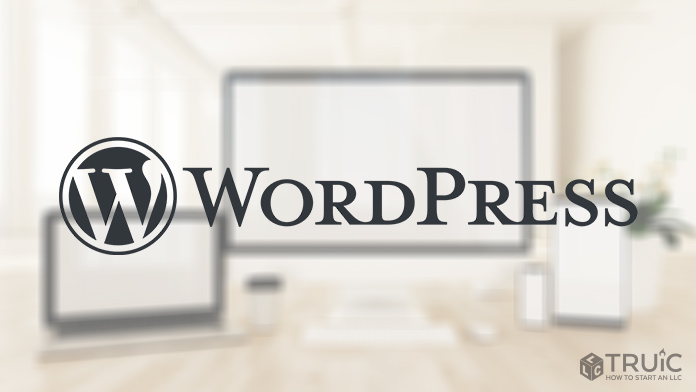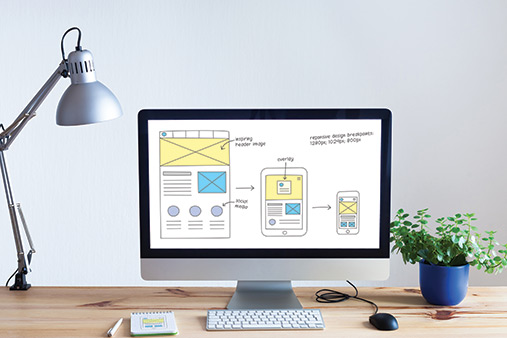WordPress Review: Is WordPress Right For Your Business?
As you’ve most likely heard by now, WordPress is one of the most popular platforms for building websites. But, as a business owner, you may not know if WordPress or a website builder would best meet your needs.
To help you decide which platform is right for you, this in-depth WordPress review will cover everything you need to know. We discuss WordPress pros and cons, WordPress credibility, and answer the question “is WordPress good?” By the end, you’ll know if WordPress is the best route for you.
Recommended: All WordPress sites need a reliable web host provider. We at TRUiC recommend Bluehost for all your WordPress hosting needs.

WordPress Review - Summary
In a nutshell, there’s a good reason why WordPress serves as the foundation for 40% of the internet. It’s a robust platform with a vast support network as well as thousands of themes and plugins from which to choose. It’s also completely free to use. If you have moderate technical skills and a willingness to learn, WordPress could provide the perfect choice for your business’s website.
Pros
- It’s almost free. Website owners must purchase a domain name and a web hosting package, but the WordPress software is completely free.
- It’s an open-source content management system (CMS). This creates seemingly endless possibilities for customizing WordPress sites.
- It’s relatively easy to install, use, and modify. Business owners with a moderate interest in — and skill level with — technology can build a WordPress website.
- It has thousands of available themes and plugins. This means website owners have access to premade templates and plugins that can enhance their site’s usability and functionality.
- It comes with a wide range of support resources. WordPress’s support page, how-to websites, blogs, social media groups, and YouTube videos provide plenty of information to help users build their sites.
- It integrates with many business-related software packages. From customer relationship management (CRM) systems to lead-generation tools, WordPress can connect to most software applications you’ll need for your business.
Cons
- It’s not a drag-and-drop website builder. True beginners will find it takes a bit of time to learn the platform and the basics needed to build and run a successful WordPress website.
- It makes you solely responsible for your website. Unless you pay for a managed WordPress hosting package, you must perform all site backups and updates, maintain site security, and complete other tasks related to managing your website.
- It’s a popular target for hackers. WordPress’s popularity and open-source CMS make it a prime target for hackers. Site owners must ensure they use a good security plugin and take additional steps to safeguard their sites.
- It may require you to learn a bit about hypertext markup language (HTML) and cascading style sheets (CSS). While you don’t need to know how to code to build your website, you may run into situations where that knowledge would prove beneficial. Most WordPress users either learn to make simple, code-based edits to their sites or hire someone to make those changes.
Subscribe to our YouTube channel
Ready To Get Started?
TRUiC readers receive a discount when they use Bluehost to host their WordPress website. If you're ready to get started, click the button below to begin hosting and building your WordPress site!
What Is WordPress?
As previously noted, WordPress is a CMS — software used to create and manage digital content. Although technically different from a website builder, WordPress still helps people build and publish websites. To learn more about WordPress and how it functions, read our What Is WordPress guide.
It's also of note that this review solely focuses on the WordPress.org CMS. You’ll most likely come across the WordPress.com hosting service, but this review excludes opinions about that service. WordPress.com is a website hosting platform that includes a pared-down version of the WordPress CMS. It’s primarily used by hobby bloggers. In contrast, WordPress.org is the full, open-source CMS that’s ideal for small to large businesses.
WordPress Pricing
As stated above, WordPress itself is free. But, you’ll have to pay for domain registration and website hosting. At some point, you also may decide to purchase paid themes or plugins for your site.
All WordPress website owners must purchase their domain names. Some web hosting providers, such as Bluehost, offer free domain registration for the first year. After that point, you’ll assume responsibility for paying for your own domain registration — a cost that typically ranges from $1 to $12.99 per year. This cost will depend on which domain registrar you use and your chosen domain extension (e.g., “.com,” “.org,” or “.net”).
WordPress site owners also must purchase a web hosting plan. Website hosting companies store your website’s information on their servers and deliver that information to your site’s visitors. You can buy a website hosting plan for as little as $3 per month and scale up, as needed. We recommend reading our Best Web Hosting Providers Review to find out which would be the right fit for your new or small business.
While you can find a slew of free WordPress themes and free WordPress plugins, some of the more robust themes and plugins require a one-time, monthly, or annual fee. When building your business website, remember to consider these potential costs and plan accordingly. Many small business websites can get by with free themes and plugins, but their owners may want to consider upgrading as their business grows.
For a deeper look at WordPress's pricing and plans, check out our page on WordPress Pricing.
WordPress vs. Website Builders
WordPress functions differently than website builders. Unlike Wix, Weebly, GoDaddy, and other website builders, it has no drag-and-drop, website-building feature. WordPress is more modular in nature, which means users must use code, themes, or plugins to build anything beyond WordPress’s core functionality. This often requires more technical skills than what’s necessary to use a website builder.
Learn more about the differences between WordPress and website builders in our How To Build a Business Website guide.
How Simple Is WordPress?
Creating a website with WordPress is relatively simple. Although using WordPress isn’t as intuitive as a website builder, business owners with moderate technical skills can find success using this platform. With WordPress’s point-and-click interface, wide range of themes and plugins, and vast knowledge base, beginners have all the tools they need to successfully build a WordPress website.
Getting Started With WordPress
It doesn’t take much to start building a WordPress website. Small business owners can get started in as little as 30 minutes by following these simple steps:
- Purchase a domain name. While some web hosting providers (e.g., Bluehost) will include the first year of domain registration for free, others require you to purchase your domain separately. Check to see if your domain name is available by using our Domain Name Generator.
- Purchase a hosting package. A variety of companies offer website hosting, but some are more reliable than others. Read our review of the Best Web Hosting Providers to learn more.
- Install your WordPress website. Most web hosting providers will include a site management tool called cPanel, which enables one-click installation of WordPress. If you purchase a managed WordPress hosting package, your hosting provider may automatically install WordPress for you.
- Start customizing your website. After installing WordPress, you can begin customizing your website to meet your specific business needs.
For more details on how to use this builder, check out these other articles:
Customizing WordPress
One of the biggest benefits of using WordPress to build your website is that it’s endlessly customizable. With the included tools and thousands of available themes and plugins, you’ll have infinite customization options.
In addition, if you ever need some functionality that doesn’t already exist in a theme or plugin, you can hire a developer to change your website’s code any way you see fit. While most small business owners will never need to hire a developer for their WordPress website, the option always remains open.
Included Tools
When a website owner logs in to the back end of their WordPress site, they’ll have access to a number of customization tools. These include:
- Appearance: From the WordPress dashboard, website owners can easily edit their website’s appearance. Some of the changes site owners can control include menus, widgets, homepage features, themes, and more.
- Posts: Website owners can use this feature to create blog posts, news articles, announcements, and more. Primarily used for timely content, this tool will add a published date to each item.
- Pages: People should use this tool to create timeless, static content. Most website owners will use it to design their “About Us,” “Services,” and “Contact Us” pages, among others.
- Media: The WordPress media library allows a site owner to add, edit, and manage all the photos, graphics, and videos they upload to their website.
- Settings: This tool gives WordPress website owners control over their site’s title, tagline, permalinks (the full format of a site’s URLs), and more.
WordPress Themes
When building a WordPress website, business owners can choose from a number of free and paid themes (also called templates) to help them design and customize their sites. Themes typically fall into one of three categories:
- Default Themes: When you install WordPress, it’ll come with a default theme. Default themes aren’t aesthetically pleasing right out of the box, and they don’t contain any kind of content or page templates. For this reason, many beginners will choose to install a theme that provides these features.
- Themes Installed From WordPress: Users can search for themes via the WordPress dashboard, which offers more than 8,000 options.
- Themes From a Marketplace: A number of WordPress theme marketplaces also offer free and paid themes.
When selecting a theme for your website, the demos show what's possible to create with that theme, not what you get upon installation. You’ll have to spend some time customizing your theme after installation. Read our Best WordPress Themes article to learn about the top five themes currently available.
WordPress Plugins
As you continue customizing your WordPress website, you may choose to install a number of free and paid plugins (or add-ons) to expand your site’s functionality. Some plugins focus on search engine optimization (SEO), some integrate with software packages like HubSpot and Shopify, and others help improve your site’s security. Plugins usually come from one of two sources:
- Plugins Installed From WordPress: From the WordPress dashboard, users can access more than 52,000 plugins and then install them with the click of a button.
- Plugins From a Marketplace: Much like theme marketplaces, plugin marketplaces allow users to search for plugins that offer specific functionality.
Read our Best Plugins for WordPress Site article to learn more about the top five plugins for WordPress users.
WordPress SEO
SEO remains a top priority for small and large businesses alike. By optimizing their websites, business owners stand a greater chance of having their site appear higher in search engine results.
With a reputation as an incredibly SEO-friendly platform, WordPress includes several features that make optimization easy for site owners. In addition, users can find a number of SEO-friendly themes and plugins to help them further optimize the design and content of their sites.
WordPress Support
While many website builders provide their users with dedicated support personnel, WordPress doesn’t. Because WordPress is an open-source CMS, website owners must turn to online resources and groups to find answers to their questions. WordPress does, however, have a dedicated support page that includes a number of helpful articles and resources.
In addition, the vast community of WordPress users often will offer help and advice free of charge. New WordPress users can seek out blog posts, Facebook® groups, Reddit™ threads, and YouTube videos that can help them build their sites. A number of WordPress web developers also offer their services on a freelance basis.
WordPress Alternatives
Subscribe to our YouTube channel
To see a comparison of all of these website builders, check out TRUiC’s Best Website Builder guide.
 |
Best Website Builders |
|---|---|
GoDaddy
4.7/5 |
Best Website Builder Overall
|
Web.com
4.5/5 |
|
Squarespace
4.4/5 |
|
Wix
4.4/5 |
|
Shopify 4.3/5 |
Best for Ecommerce
|
WordPress 4.1/5 |
|
WordPress Review - Conclusion
After reviewing WordPress’s functionality, user interface, themes, plugins, and knowledge base, we’re very impressed with this CMS. It’s a great option for technically savvy small business owners with an interest in learning how to use this website-building platform.
Who Shouldn’t Use WordPress?
- Any business whose website is meant to support their business
- People who prefer drag-and-drop website builders
- Technical novices with no time to learn new skills
- Business owners seeking a hands-off approach to website maintenance
Who Should Use WordPress?
- Any business whose website is their business, such as a blog, ecommerce store, or software-as-a-service (SaaS) company
- Small, medium, and large businesses
- Business owners with moderate technical skills
- People interested in having complete control over how their website works
Build Your Site With WordPress
WordPress is a proven solution that powers over 40% of all websites. While it's not the most simple system to use for beginners its flexibility and expandability are unmatched by other website builders. If your business requires a more complicated website or you have access to an experienced developer WordPress is the tool for you.


